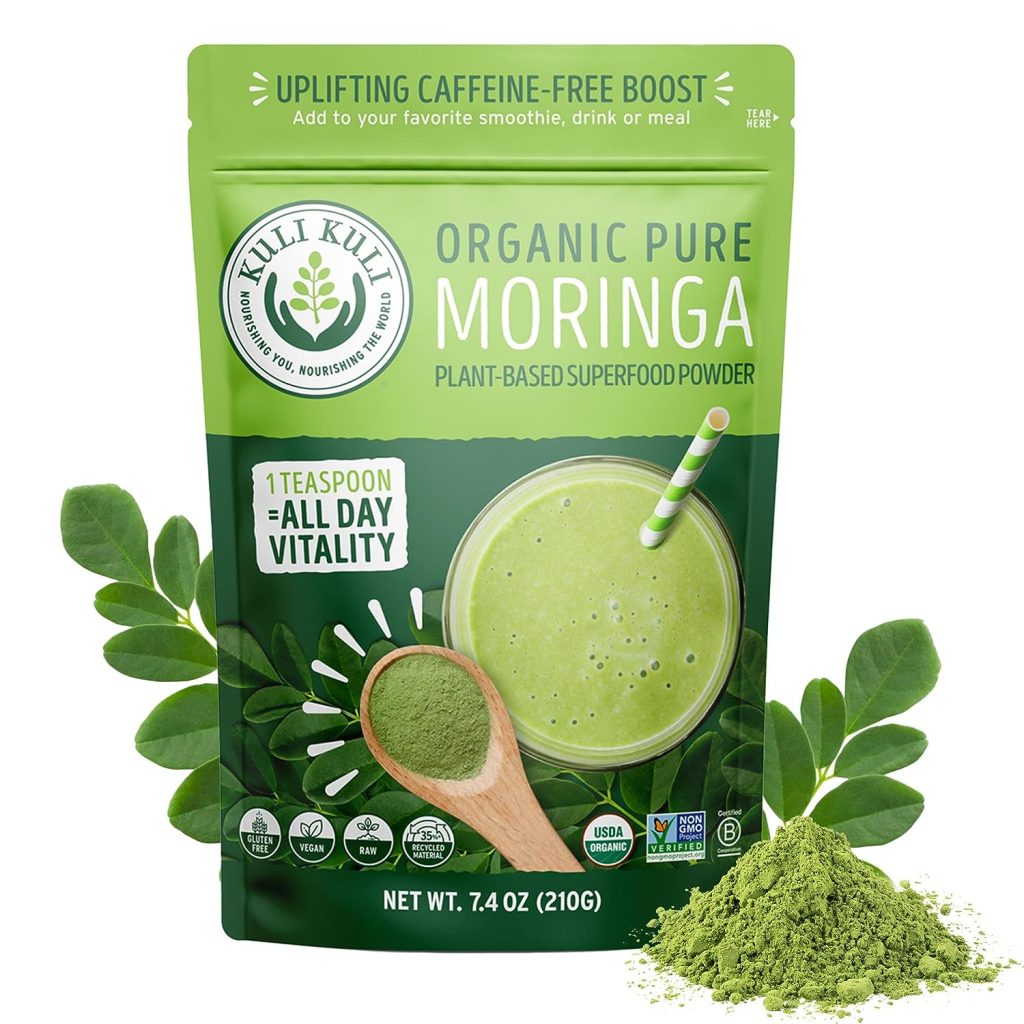Boosting Your Immunity With Moringa Tea
Moringa tea stands as a powerhouse for daily nutrient intake, offering numerous health benefits that contribute to a healthier lifestyle. As you savor your tea, the question naturally arises – what exactly are the benefits that Moringa tea brings to the table?
The Top 10 Benefits of Drinking Moringa Tea Everyday
Moringa tea is a great way to get your daily dose of nutrients. It has many benefits that can help you live a healthier life.
Here are the top 10 benefits that Moringa tea is good for:
1) Antioxidant and Anti-inflammatory Powerhouse: Moringa tea is rich in antioxidants and anti-inflammatory properties which can help reduce the risk of heart disease, cancer, and diabetes.
2) Immune System Boost: Moringa tea is high in vitamin C which helps boost your immune system and fight off infections.
3) Blood Pressure Regulation: Moringa tea is rich in potassium which helps regulate blood pressure levels and prevent kidney stones.
4) Natural Anti-Aging: Moringa tea has natural anti-aging properties that can help slow down the aging process by reducing wrinkles and fine lines on the skin.
5) Bone and Teeth Strength: Moringa tea contains calcium which helps strengthen bones and teeth, preventing tooth decay, and osteoporosis.
6) Hypertension Reduction: Moringa tea can help reduce hypertension and improve overall heart health.
7) Blood Sugar Regulation: Moringa tea can help regulate blood sugar levels and prevent diabetes.
8) Energy Boost and Metabolism: Moringa tea is rich in vitamin B9 which helps with energy levels, healthy metabolism, and weight loss.
9) Caffeine-Free Option: Moringa tea contains no caffeine which means it is a great option for those sensitive to the stuff.
10)Cholesterol Control: Moringa tea helps control cholesterol and lower blood pressure.
At Morning Gardens, we also wrote an article about the recommended amount of Moringa you can start off with each day:
How to make Moringa Tea
Moringa tea is a popular beverage globally, made from the leaves of the Moringa plant. To prepare, boil water and add Moringa leaves. Enhance the flavor with ginger, honey, and lemon juice for a delightful and nutritious experience.

Our main guide Moringa 101 can be found in the article below:
Alternatively, you can make Moringa tea using organic Moringa powder made from the leaves. One of our favorite brands to buy Moringa powder is Organic Pure Moringa by Kuli Kuli, a well established brand in the space!
Our current Moringa tea recipe
- Dried Moringa Leaves
- Boiling Water
- Honey
- Ginger
- Lemon Juice
The quantities you use depends on how sweet you want it.
The contrasting flavors of Ginger, Honey and Lemon Juice combined to make an awesome flavor.
Sometimes sweeteners (Like Honey) help mask the bitter taste of Moringa.
The process to make Moringa tea:
- Boil water for ~2-3 minutes
- Add in Ginger
- Boil the Ginger water for 2-3 minutes
- Add in Moringa
- Boil the Moringa and Ginger for another 2-3 minutes
- Turn off the boiling water
- Move the Ginger and Moringa boiled water to another cup
- Once near drinking temperature, add in both Honey and Lemon Juice
Check out this video guide for help:
Does Moringa have Antibiotic Properties?
Numerous studies highlight Moringa’s antibiotic properties, making it a potential alternative to conventional antibiotics. In a 2017 study published by MDPI, several researchers make the point that plant-based antibiotics could become a viable alternative to the mass-produced ones we’re currently using, and could potentially “break the resistance among microbes.”
So how does Moringa fit in?
The role of Moringa in combating bacterial infections is a subject of extensive scientific investigation. Numerous studies have delved into assessing the antibiotic properties of Moringa, consistently yielding affirmative results. In a noteworthy 2016 study, Moringa demonstrated its efficacy by combating 13 different types of bacteria, covering nearly 70% of those tested. Another study underscored the significance of Moringa leaf extract in combating various bacteria, including the notorious E. coli and Staph aureus.
Dr. Fahey, a distinguished Doctor of Science and assistant professor at Johns Hopkins School of Medicine and School of Public Health, has dedicated decades to the study of Moringa. His comprehensive review integrates data and research from numerous sources, shedding light on the manifold health benefits of Moringa. Recent findings reveal Moringa’s potential to inhibit Helicobacter pylori, a bacterium implicated in conditions such as peptic ulcers and stomach cancer.
Additional evidence supporting Moringa’s antibiotic properties comes from a 2014 study, where Moringa bark extract, administered at a 40 mL dose, exhibited a significant positive impact in treating urinary tract infections (UTIs), conditions typically managed with antibiotics. Another study explored Moringa seeds and leaves also corroborated their antibiotic properties. A third study looked specifically at Moringa leaves in relation to 6 different bacterias, including the notorious E. coli and found that Moringa had a significant antibiotic effect on them.
A particularly compelling study, published by BioMed Central, delves into the potential of not only Moringa but also passion fruit and arrowleaf elephant ear in addressing multi-drug resistant (MDR) bacteria. These are bacteria that have developed immunity and resistance to many conventional antibiotics, posing a severe threat. The study’s authors concluded that all three plants, including Moringa, hold promise in controlling MDR bacteria, presenting a potential breakthrough in antibiotic research.
When Is The Best Time To Drink Moringa Tea?
Moringa tea is best consumed in the morning. Its high antioxidant content aids in immune support, energy boost, and overall well-being. It will also keep you feeling full longer throughout the day.
Participants have been feeling the difference almost immediately. When they add in Moringa Tea into their morning ritual, they were able to feel the benefits incredibly quickly.
How should I get Moringa?
Moringa can be obtained by growing your own plant or purchasing it.
The Moringa plant is versatile, thriving in various climates and offering leaves rich in protein, vitamin C, calcium, and iron.
It can grow up to 25 feet in height and can be planted during any season of the year, as long as it is planted in well-drained soil. To learn more about how fast the Moringa tree grows, you can check out this article:
In America, this root grows very well in Florida and some other southern regions. This is because the soil is dry and the Moringa tree is able to grow and flourish without much water.
It is a great plant to grow in areas where there is little rainfall because it can still produce leaves even in drought conditions.
Growing vs. Buying A Moringa Tree
Growing your own Moringa tree is not as easy as it sounds. It needs a lot of patience, time, and hard work. But if you decide to commit to growing one yourself, it’s a very rewarding feeling!
Benefits of Growing Moringa at Home:
- Backyard or Terrace Cultivation: The flexibility to cultivate Moringa in your backyard or on the terrace provides accessibility and convenience.
- Environmental Impact: Growing Moringa at home contributes to reducing pollution, aligning with eco-friendly practices.
- Cost-Effectiveness: Home cultivation proves to be more cost-effective than buying from the market, offering a sustainable and economical option.
However, the challenge of space may arise, particularly when drying the leaves. Sufficient sunlit space is essential, which might pose difficulties based on your housing arrangement.
If you are interested to learn more about how to plant your own Moringa tree in seven simple steps, check out this article below:
Conclusion
In summary, Moringa tea offers a myriad of health benefits, including antioxidant power, immune system support, blood pressure regulation, and more.
Its antibiotic properties and potential in addressing multi-drug resistant bacteria make it a valuable addition to daily wellness. While enjoying Moringa tea, consider the best time to drink it, which we recommend is in the morning and on an empty stomach. Remember, the benefits of Moringa are substantial, but it’s important to consult with your doctor, especially if you have existing health conditions or are taking medications.
Consider starting your day with a cup of Moringa Tea tomorrow morning and experience the potential difference. I promise you, the results will not disappoint!

For years now, Moringa has been a daily consumption in my life, incorporated in various forms such as capsules, food recipes, and soothing teas. Initially, my daughter and I embarked on this journey as an experiment, but as time went on, I delved deeper into its remarkable potential and unearthed the unlimited benefits it offers for our well-being and health. I got motivated by how much it positively impacted me and decided to share my insights about Moringa’s profound impact on health and overall living through my blog posts.

